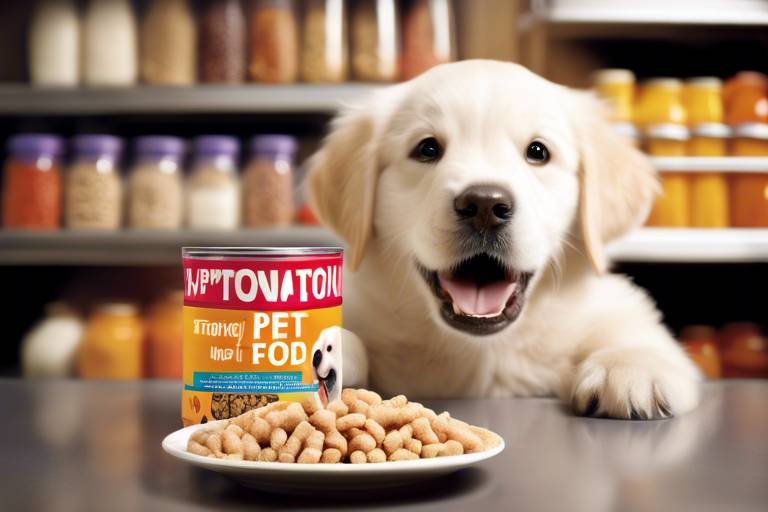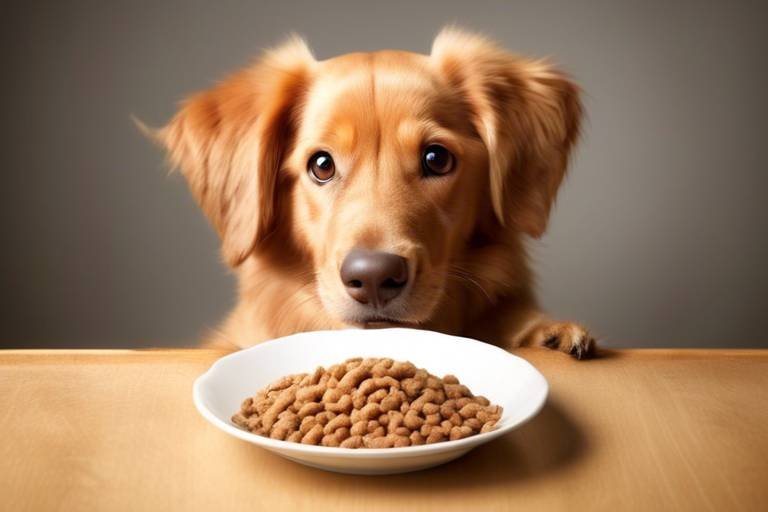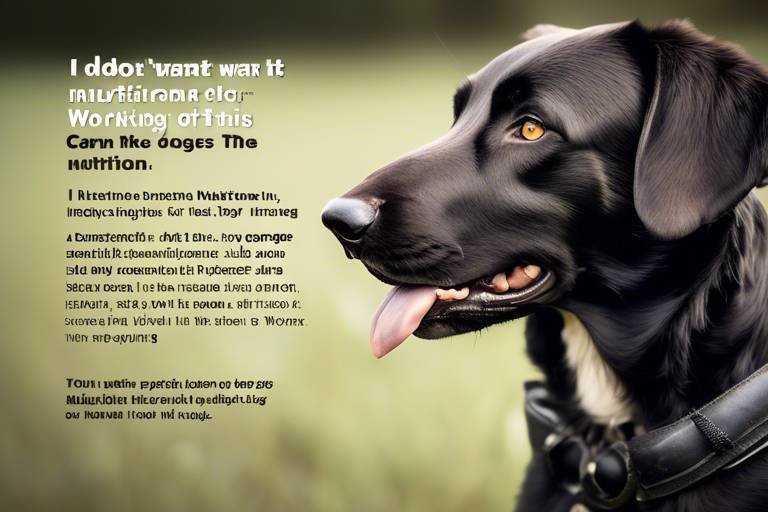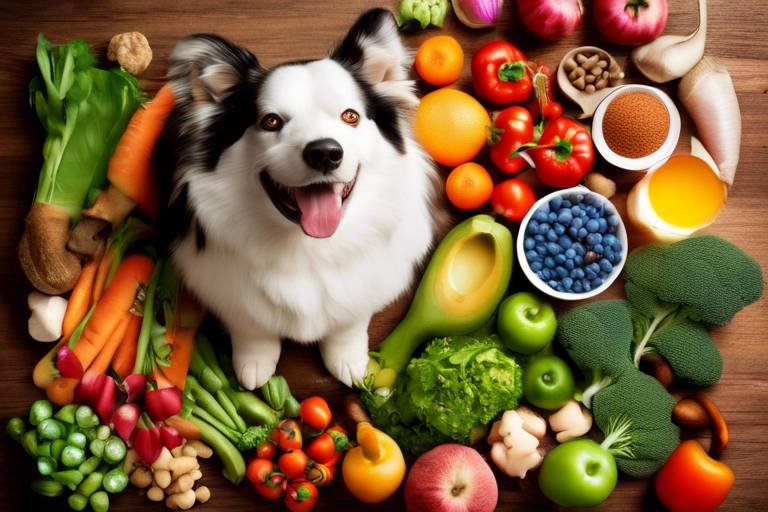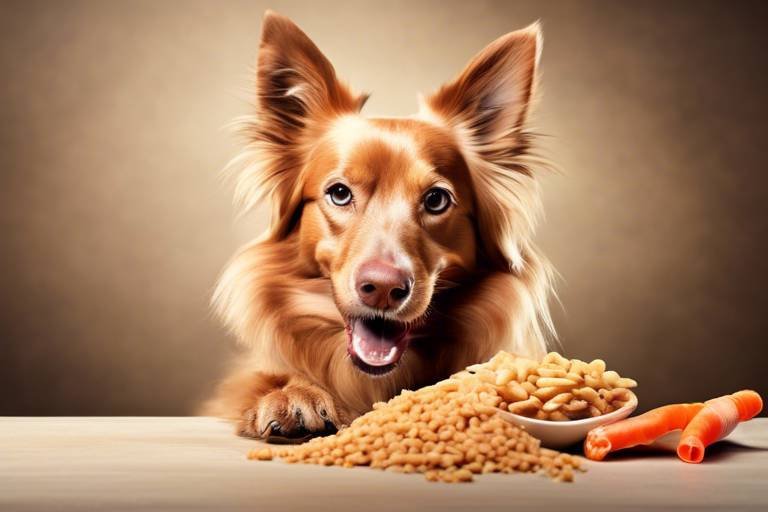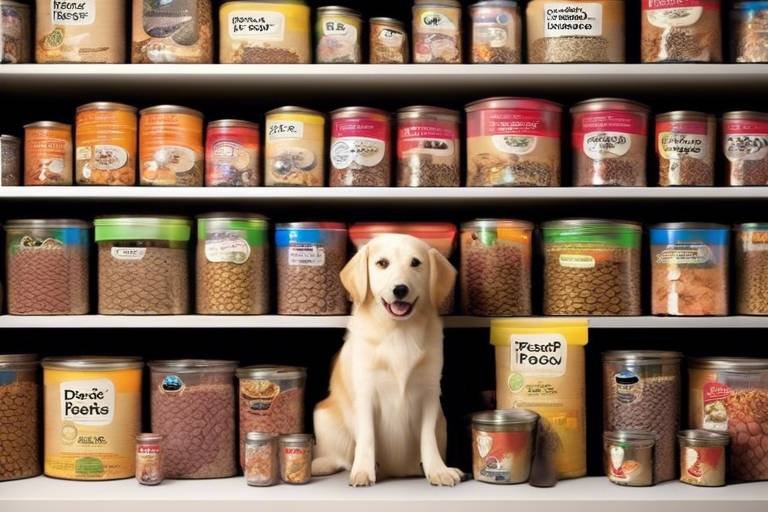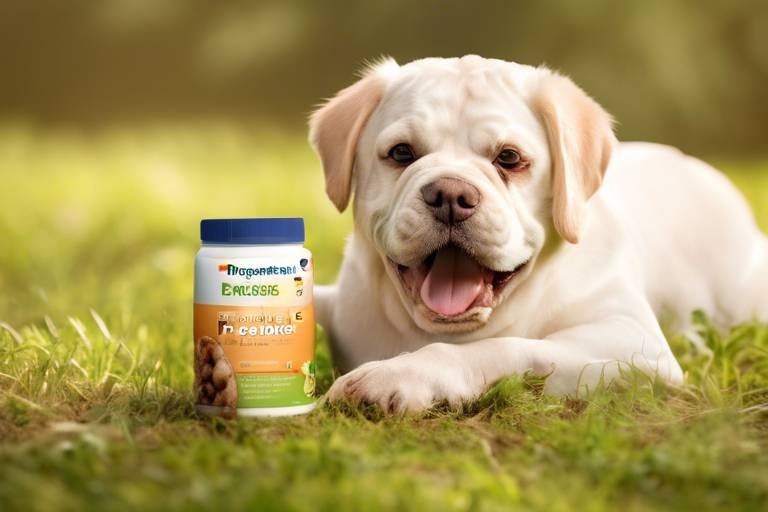The Role of Nutritional Assessment in Pet Health
Nutritional assessment is a vital aspect of ensuring our furry friends lead healthy and happy lives. Just like humans, pets require a balanced diet to thrive, and understanding their specific nutritional needs can make all the difference. Imagine trying to fuel a high-performance car with the wrong type of gasoline; it simply won't run optimally. Similarly, a pet fed an inadequate or unbalanced diet may face a myriad of health issues. In this article, we will delve into the significance of nutritional assessment in maintaining and improving pet health, exploring various factors that contribute to a pet's dietary needs and overall well-being.
Nutrition is the cornerstone of health for pets, playing a critical role in their development, energy levels, and overall vitality. Just as a well-balanced meal can boost our mood and energy, the right nutrition can enhance a pet's quality of life. A proper diet can help prevent various health issues, including obesity, diabetes, and heart disease. By understanding the nutritional requirements of pets, owners can make informed decisions about their diets, leading to better health outcomes. For instance, a diet rich in essential fatty acids can improve coat quality, while adequate protein intake supports muscle development and repair. It's essential to recognize that nutrition is not a one-size-fits-all approach; different pets have different needs based on factors such as age, breed, and health status.
Identifying common nutritional deficiencies is crucial for pet owners to recognize potential health risks. A balanced diet should include a variety of nutrients, including proteins, fats, carbohydrates, vitamins, and minerals. However, many pets fall short in certain areas. For example, a lack of Omega-3 fatty acids can lead to skin issues and inflammation, while insufficient calcium can affect bone health. Here are some common deficiencies to be aware of:
- Omega-3 Fatty Acids: Important for skin and coat health, as well as joint function.
- Calcium: Essential for strong bones and teeth, especially in growing animals.
- Vitamins A and E: Crucial for vision, immune function, and skin health.
By recognizing these deficiencies, pet owners can take proactive steps to ensure their pets receive a balanced diet tailored to their specific needs.
As pets age, their nutritional requirements change significantly. Just like how our bodies need different nutrients as we grow older, pets also experience shifts in their dietary needs throughout their life stages. Puppies and kittens require higher levels of protein and calories to support their rapid growth, while senior pets may benefit from diets lower in calories but higher in fiber to aid digestion and maintain a healthy weight. It’s essential to adjust their diets accordingly to support their health and vitality. For instance, an older dog may need joint supplements and easier-to-digest foods to maintain their energy levels without putting on unnecessary weight.
Proper nutrition during the early stages of life is essential for growth and development. Puppies and kittens are like sponges, soaking up everything they need to grow into healthy adults. A diet rich in high-quality protein, essential fatty acids, and vitamins is crucial during this stage. Feeding them a balanced diet not only promotes healthy growth but also sets the foundation for long-term health and wellness. Think of it as building a house; a strong foundation is necessary for a sturdy structure.
Senior pets require special dietary considerations to manage age-related health issues. As pets age, they often face challenges such as decreased metabolism, dental problems, and joint pain. A tailored diet can help manage these issues, ensuring that older pets maintain their quality of life. For example, incorporating joint supplements into their diet can alleviate discomfort and improve mobility. Additionally, senior pets may benefit from softer, easier-to-chew food to accommodate dental issues. It’s all about making adjustments that cater to their changing needs.
Various methods can be employed to assess a pet's nutritional status. Body condition scoring is a popular technique where a veterinarian evaluates a pet's weight and body fat to determine if they are underweight, ideal, or overweight. Furthermore, dietary history evaluations can provide insights into a pet's eating habits and preferences, helping to identify any potential deficiencies. These assessments ensure that dietary needs are met effectively, paving the way for healthier pets.
Every pet is unique, and customizing their diet based on specific health conditions, activity levels, and preferences can enhance their overall health and happiness. Just like how we have our favorite meals that make us feel good, pets also have preferences that can be incorporated into their diets. For instance, a highly active dog may require more calories and protein to support their energy levels, while a less active pet may need a diet lower in calories to prevent obesity. Taking the time to tailor a pet's diet can make a significant difference in their well-being.
Certain health conditions, such as obesity or diabetes, require specialized dietary approaches to manage symptoms. For example, pets with obesity may benefit from high-fiber diets that promote satiety while reducing calorie intake. On the other hand, diabetic pets may need diets low in carbohydrates to help regulate their blood sugar levels. Understanding these dietary considerations is essential for promoting better health outcomes for affected pets.
Consulting with a veterinarian is crucial in developing an effective nutritional assessment and dietary plan. Veterinarians can provide invaluable insights into a pet's specific needs and recommend appropriate diet modifications. They can also help identify any underlying health issues that may be affecting a pet's nutritional status. Ultimately, ensuring pets receive the best possible care tailored to their individual needs is a shared responsibility between pet owners and veterinary professionals.
- What is the best diet for my pet? The best diet varies by pet; consult your veterinarian for personalized recommendations.
- How often should I assess my pet's nutrition? Regular assessments, at least annually, are recommended, especially as pets age.
- Can I feed my pet homemade food? Yes, but it's essential to ensure it meets all nutritional requirements; consult a vet for guidance.

The Importance of Nutrition for Pets
When it comes to our furry friends, nutrition is not just a matter of filling their bowls; it’s the cornerstone of their overall health and well-being. Just like us, pets require a balanced diet to thrive, and understanding this can lead to better dietary choices that significantly improve their quality of life. Imagine feeding your pet the equivalent of fast food every day—while it might seem convenient, it can lead to a host of health issues. Poor nutrition can pave the way for obesity, diabetes, and even heart disease in pets. Therefore, making informed decisions about their diet is crucial.
So, what exactly does a balanced diet look like for pets? It’s not a one-size-fits-all situation. Various factors come into play, including the pet's age, breed, size, and activity level. For instance, active dogs need more calories than their less active counterparts. Similarly, a kitten’s nutritional needs vastly differ from those of a senior cat. By understanding these nuances, pet owners can tailor their pets' diets to meet their unique needs, ensuring they get the right nutrients at every stage of life.
Moreover, the impact of nutrition goes beyond just physical health. A well-nourished pet is often more energetic, playful, and emotionally balanced. They are less likely to suffer from behavioral issues that can arise from nutritional deficiencies. Think about it: a dog that receives a proper diet is more likely to be happy and engaged, while one that doesn’t may become lethargic or irritable. Nutrition truly plays a vital role in shaping not just the body, but also the mind of our pets.
In addition to preventing health problems, proper nutrition can enhance the effectiveness of veterinary care. For example, if a pet is recovering from surgery or illness, a nutrient-rich diet can support their healing process. On the flip side, if a pet is already facing health challenges, such as kidney disease or allergies, their dietary needs may change dramatically. In such cases, consulting with a veterinarian can help you understand the specific nutritional requirements your pet needs to combat these issues.
To summarize, the importance of nutrition for pets cannot be overstated. It is essential for maintaining their health, preventing diseases, and enhancing their quality of life. By being proactive and informed about your pet's dietary needs, you can ensure they live a longer, healthier, and happier life. So, the next time you’re at the pet store, think twice about what goes into that cart. Your pet deserves the best!

When it comes to our furry friends, understanding their nutritional needs is paramount. Just like humans, pets can suffer from various nutritional deficiencies that can lead to serious health issues. These deficiencies often stem from a lack of essential nutrients in their diet, which can impact their overall well-being. For instance, a diet lacking in vital vitamins and minerals can cause a range of problems, from poor coat quality to more severe health conditions.
One of the most common deficiencies seen in pets is protein deficiency. Proteins are the building blocks of life, crucial for growth, tissue repair, and overall health. A lack of protein can lead to muscle wasting, lethargy, and a weakened immune system. It's essential to ensure that your pet's diet includes high-quality protein sources, such as meat, fish, or legumes, to support their health.
Another significant deficiency is fatty acid deficiency. Omega-3 and Omega-6 fatty acids are vital for maintaining healthy skin and a shiny coat. If your pet's diet is low in these essential fatty acids, they may experience dry skin, itching, and even inflammation. Including sources of these fatty acids, such as fish oil or flaxseed oil, can help keep your pet's skin and coat in top condition.
Vitamins and minerals also play a crucial role in your pet's health. For example, vitamin A is essential for vision and immune function, while calcium is vital for bone health. A deficiency in these nutrients can lead to serious health problems. For instance, a lack of calcium can result in bone deformities and dental issues, especially in growing puppies and kittens. It's vital to ensure that your pet's diet is well-balanced and includes all necessary vitamins and minerals.
To help pet owners better understand the potential deficiencies their pets may face, we've summarized some of the most common nutritional deficiencies in the table below:
| Nutrient | Common Deficiency Symptoms | Sources |
|---|---|---|
| Protein | Muscle wasting, lethargy, weakened immune system | Meat, fish, legumes |
| Fatty Acids | Dry skin, itching, inflammation | Fish oil, flaxseed oil |
| Vitamin A | Poor vision, immune dysfunction | Liver, fish, carrots |
| Calcium | Bone deformities, dental issues | Dairy products, leafy greens, supplements |
Recognizing these deficiencies is the first step in ensuring your pet receives a balanced diet. If you suspect your pet may be lacking in certain nutrients, it's crucial to consult with a veterinarian. They can provide guidance on dietary adjustments and recommend supplements if necessary. After all, a well-nourished pet is a happy and healthy pet!
- What are the signs of nutritional deficiency in pets? Look for signs like lethargy, poor coat condition, weight loss, or changes in behavior.
- How can I ensure my pet's diet is balanced? Consult with a veterinarian to evaluate your pet's dietary needs and make necessary adjustments.
- Are commercial pet foods sufficient for my pet's nutritional needs? Many commercial pet foods are formulated to meet basic nutritional requirements, but it's essential to choose high-quality brands and consult with your vet.
- Can I give my pet supplements to address deficiencies? Yes, but it's crucial to consult with a veterinarian before adding any supplements to your pet's diet.
As our beloved pets age, their nutritional needs undergo significant changes, much like how our own dietary requirements evolve through the different stages of life. Just as a toddler needs more calcium for growing bones, senior pets require a tailored diet to support their changing bodies. This transition is crucial; failing to adjust their nutrition can lead to a myriad of health issues. For instance, younger pets are often bursting with energy, necessitating a diet rich in proteins and fats to fuel their playfulness. In contrast, older pets tend to be less active and may need fewer calories but more fiber to aid digestion.
When considering the dietary needs of pets at different life stages, it’s essential to recognize that each phase brings unique challenges and requirements. For example, puppies and kittens experience rapid growth and require a diet that supports their development. This includes higher levels of protein, fat, and essential nutrients like DHA for brain development. On the other hand, senior pets might face health issues such as arthritis or kidney disease, making it imperative to provide them with a diet that is not only nutritious but also gentle on their systems.
To illustrate the differences in nutritional needs across various life stages, here’s a simple breakdown:
| Life Stage | Nutritional Focus | Key Nutrients |
|---|---|---|
| Puppy/Kitten | Growth and Development | High Protein, DHA, Calcium, Phosphorus |
| Adult | Maintenance | Balanced Protein, Fats, Vitamins |
| Senior | Health Maintenance | Lower Calories, Fiber, Omega Fatty Acids |
As pets transition from one life stage to another, it’s critical for pet owners to consult with their veterinarians. This collaboration ensures that dietary adjustments are made based on the pet’s health status, lifestyle, and any specific medical conditions. For instance, a senior dog with arthritis might benefit from a diet rich in omega-3 fatty acids to help reduce inflammation, while a young cat may require a protein-rich diet to support its playful nature.
In conclusion, understanding the impact of age on nutritional needs is vital for every pet owner. By recognizing and adapting to these changes, we can help our furry friends live longer, healthier, and happier lives. After all, a well-nourished pet is a happy pet!
- What should I feed my senior pet? Senior pets typically require diets lower in calories but higher in fiber and essential nutrients to support their health.
- How can I tell if my pet is getting the right nutrition? Regular veterinary check-ups and assessments can help determine if your pet’s diet meets their nutritional needs.
- Are there specific foods I should avoid for older pets? Yes, foods high in calories, artificial additives, and excessive fats should be avoided to prevent weight gain and health issues.
When it comes to the early stages of life, puppies and kittens have unique nutritional needs that are crucial for their growth and development. Just like a seed requires the right environment to blossom into a beautiful flower, young pets need the right nutrients to thrive. A well-balanced diet during this formative period can significantly impact their long-term health, influencing everything from their immune system to their energy levels.
During the first few months, puppies and kittens experience rapid growth, which demands a diet rich in essential nutrients. These include proteins, fats, vitamins, and minerals. A high-quality commercial pet food specifically formulated for puppies and kittens is often the best choice, as it provides a balanced ratio of these nutrients. For instance, protein is vital for muscle development, while fats are crucial for energy and healthy skin and coat. Additionally, certain vitamins and minerals, such as calcium and phosphorus, play a pivotal role in bone development.
It's also important to consider the feeding schedule for your young pet. Puppies and kittens typically require more frequent meals than adult pets. A suggested feeding schedule might look like this:
| Age | Feeding Frequency |
|---|---|
| 8-12 weeks | 4 meals a day |
| 3-6 months | 3 meals a day |
| 6 months - 1 year | 2 meals a day |
As your puppy or kitten grows, it's crucial to monitor their weight and overall health. Regular vet check-ups can help ensure that they are on the right track. If you notice any signs of lethargy, poor coat condition, or digestive issues, it might be time to reassess their diet. Remember, just like we need to adjust our diets as we grow older, so do our furry friends!
In summary, proper nutrition for puppies and kittens is not just about feeding them; it's about laying the foundation for a healthy and vibrant life. By providing them with a balanced diet tailored to their specific needs, you are not just feeding them; you are nurturing their potential to grow into strong, healthy adults.
- What should I feed my puppy or kitten? - Look for high-quality commercial foods specifically formulated for their life stage, ensuring they contain the right balance of nutrients.
- How often should I feed my young pet? - Puppies and kittens typically require more frequent meals, starting with four times a day for very young pets and gradually reducing to two meals a day as they grow.
- Can I give my puppy or kitten homemade food? - While homemade diets can be suitable, it's essential to consult with a veterinarian to ensure they are nutritionally balanced.
- What signs indicate my pet is not getting enough nutrition? - Look for signs like poor coat condition, lethargy, and digestive issues, which may indicate a need for dietary adjustment.
As our beloved furry friends age, their nutritional needs change significantly, much like how our dietary preferences evolve as we grow older. It's essential to recognize that senior pets require specialized nutrition to maintain their health and vitality. Just like humans, older pets face a variety of health challenges, including arthritis, dental issues, and decreased metabolism. Therefore, adjusting their diet is crucial to help them navigate these changes gracefully.
One of the primary considerations in senior pet nutrition is the balance of macronutrients. Older pets often benefit from diets that are lower in calories but high in protein. This helps maintain muscle mass while preventing obesity, which can exacerbate many age-related health issues. Additionally, incorporating fiber into their diet can aid digestion and promote a healthy gut, which is particularly important as their digestive systems may not function as efficiently as they once did.
Moreover, senior pets may require enhanced levels of certain nutrients to support their aging bodies. For instance, antioxidants like vitamins E and C can help combat oxidative stress and support overall immune function. Omega-3 fatty acids, often found in fish oil, can significantly reduce inflammation and support joint health, which is crucial for active older pets. It’s like giving them a little extra boost to keep them feeling spry!
When planning a senior pet's diet, it's also important to consider their specific health conditions. For example, pets with kidney disease may require a diet lower in protein and phosphorus, while those with heart issues might need reduced sodium intake. Here’s a quick overview of dietary adjustments based on common health concerns:
| Health Condition | Dietary Adjustment |
|---|---|
| Obesity | Lower calorie intake, higher fiber |
| Kidney Disease | Lower protein and phosphorus |
| Heart Disease | Reduced sodium |
| Arthritis | Increased omega-3 fatty acids |
Regular veterinary check-ups are essential for monitoring a senior pet's health and adjusting their diet accordingly. Just as we might consult a nutritionist for our dietary needs, pets benefit from professional guidance tailored to their unique circumstances. This ensures that they receive a well-rounded diet that addresses their specific health challenges.
Ultimately, keeping senior pets healthy and happy is about more than just food; it’s about providing them with the love and care they deserve. By paying attention to their changing nutritional needs, pet owners can help their furry companions enjoy their golden years to the fullest.
- How do I know if my senior pet needs a dietary change? Look for signs such as weight gain, lethargy, or changes in eating habits. Regular vet visits can also help assess their dietary needs.
- Can I feed my senior pet the same food as my younger pet? It's generally not recommended, as senior pets have different nutritional requirements that may not be met by standard pet food.
- How can I make my senior pet's food more appealing? Consider adding warm water or low-sodium broth to their food, or mixing in some wet food to enhance flavor and aroma.
Nutritional assessment techniques are vital tools in ensuring that our furry friends receive the right balance of nutrients necessary for their health and well-being. Just like humans, pets have unique dietary needs that can vary based on factors such as age, breed, activity level, and existing health conditions. So, how do we figure out what our pets really need? This is where nutritional assessment comes into play.
One of the most effective methods for assessing a pet's nutritional status is through body condition scoring (BCS). This technique involves evaluating a pet's body shape and weight to determine if they are underweight, ideal, or overweight. The BCS is typically rated on a scale from 1 to 9, with 1 being emaciated and 9 being severely obese. A score of 4 to 5 usually indicates a healthy weight. By regularly monitoring your pet's BCS, you can catch potential weight-related health issues early, allowing for timely dietary adjustments.
Another important technique is the dietary history evaluation. This involves gathering detailed information about what your pet eats, how much, and how often. It’s essential to note any treats or table scraps that may contribute to their overall caloric intake. A comprehensive dietary history can reveal imbalances and deficiencies in a pet’s diet, helping owners make informed choices about food selections. For instance, if a pet is primarily fed dry kibble but rarely receives fresh fruits or vegetables, they might be missing out on crucial vitamins and minerals.
In addition to BCS and dietary history, laboratory tests can provide deeper insights into a pet’s nutritional health. Blood tests can help identify deficiencies in essential nutrients, such as vitamins or minerals, and can also reveal underlying health conditions that may affect nutritional needs. For example, a blood test might show elevated glucose levels in a diabetic pet, indicating the need for a specialized diet.
Lastly, keeping a food diary can be an invaluable tool for pet owners. By tracking what and when your pet eats, along with any changes in their behavior or health, you can spot trends that might indicate a nutritional issue. This record can be especially helpful during veterinary visits, as it provides a clear picture of your pet's eating habits over time.
In summary, utilizing various nutritional assessment techniques can significantly enhance our understanding of our pets' dietary needs. By combining body condition scoring, dietary history evaluations, laboratory tests, and food diaries, pet owners can develop a comprehensive picture of their pet's health. This proactive approach not only helps in making informed dietary choices but also ensures that our beloved companions lead happy, healthy lives.
- How often should I assess my pet's nutritional status? It's recommended to assess your pet's nutritional status at least once every six months, or more frequently if you notice changes in their weight or health.
- What should I do if my pet is overweight? Consult with your veterinarian to create a weight management plan that includes a balanced diet and an appropriate exercise regimen.
- Can I use human food as part of my pet's diet? While some human foods are safe for pets, it's crucial to consult your veterinarian to ensure they meet your pet's specific dietary needs.

When it comes to our furry friends, one size definitely does not fit all. Just like humans, pets have their own unique personalities, activity levels, and health needs that require a customized approach to their diet. Imagine trying to wear a pair of shoes that were made for someone else—uncomfortable, right? The same goes for pets and their food. Tailoring a diet specifically for your pet can significantly enhance their overall health and happiness.
First and foremost, it’s essential to consider your pet's age, breed, and activity level. For instance, a young, energetic puppy will have vastly different nutritional needs compared to a senior dog that prefers lounging around the house. Puppies need a diet rich in protein and calories to support their rapid growth, while older pets may benefit from lower-calorie options to prevent obesity. This is where understanding your pet’s life stage becomes crucial.
Additionally, specific health conditions can dictate dietary requirements. For instance, pets suffering from diabetes need a diet that helps regulate their blood sugar levels, while those with kidney disease may require a low-protein diet. By addressing these health issues through a customized diet, you can help manage symptoms and improve your pet's quality of life. Here’s a quick overview of how different conditions can influence dietary needs:
| Health Condition | Dietary Considerations |
|---|---|
| Obesity | Lower calorie, higher fiber |
| Diabetes | Complex carbohydrates, controlled protein |
| Kidney Disease | Low protein, low phosphorus |
| Allergies | Limited ingredient diets |
Moreover, personal preferences play a significant role in a pet’s eating habits. Some pets may be picky eaters, while others might have a penchant for specific flavors or textures. It’s essential to experiment with different food types—be it wet, dry, or raw—to find what your pet enjoys most. You wouldn’t want to eat the same bland meal every day, would you? Variety is the spice of life, even for pets!
Lastly, it’s always a good idea to involve your veterinarian in the dietary customization process. They can provide invaluable insights and recommendations based on your pet’s specific needs, ensuring that they receive a balanced and nutritious diet tailored just for them. After all, a well-fed pet is a happy pet!
- How do I know if my pet needs a special diet? If your pet is experiencing health issues, consult your veterinarian for a dietary assessment.
- Can I switch my pet's food abruptly? It's best to transition gradually to avoid digestive upset—mix the new food with the old over several days.
- Are homemade diets safe for pets? Homemade diets can be safe but should be formulated carefully to ensure they meet all nutritional needs.
When it comes to our furry friends, one size does not fit all, especially when considering their dietary needs. Just like humans, pets can suffer from a variety of health issues that require tailored dietary approaches. For instance, pets diagnosed with obesity must be managed with a carefully controlled diet to promote weight loss while still providing essential nutrients. This often means reducing calorie intake while increasing fiber to help them feel full without overindulging. Imagine trying to lose weight while still enjoying your meals; that’s the delicate balance we strive for in our pets’ diets!
Similarly, pets with diabetes require a diet that helps regulate their blood sugar levels. This typically involves feeding them high-quality protein and complex carbohydrates, which digest slowly and prevent sudden spikes in glucose. It’s essential to monitor their carbohydrate intake closely, as too many simple sugars can lead to severe health complications. Think of it as managing a rollercoaster ride: we want a smooth, steady climb rather than sudden drops that can make everything feel out of control.
Furthermore, pets with kidney disease need a special diet low in protein and phosphorus to reduce the workload on their kidneys. This means selecting foods that are not only palatable but also nutritionally balanced to ensure they are getting the necessary nutrients without overloading their system. It’s akin to running a marathon; we want to pace ourselves and not exhaust our energy reserves too quickly!
To help pet owners navigate these dietary considerations, it is crucial to consult with a veterinarian. They can provide guidance on the most suitable foods and portion sizes, ensuring that the pet's specific health issues are addressed effectively. Below is a table summarizing dietary considerations for common health issues:
| Health Issue | Dietary Considerations |
|---|---|
| Obesity | Reduced calorie intake, increased fiber |
| Diabetes | High-quality protein, complex carbohydrates |
| Kidney Disease | Low protein and phosphorus |
In conclusion, understanding the dietary needs of pets with specific health issues is essential for their overall well-being. By making informed decisions and working closely with a veterinarian, pet owners can create a balanced diet that supports their pet's health, helping them lead happier, healthier lives. Remember, it’s not just about feeding them; it’s about nourishing them in a way that complements their unique health journey!
- What should I do if my pet is overweight? Consult your veterinarian for a weight loss plan that includes a calorie-controlled diet and regular exercise.
- Can I feed my diabetic pet regular dog food? No, diabetic pets require a specialized diet to manage their blood sugar levels effectively.
- How can I tell if my pet has a nutritional deficiency? Look for signs such as dull fur, lethargy, or sudden weight changes, and consult your vet for a proper assessment.
When it comes to ensuring your furry friend leads a happy and healthy life, veterinary guidance plays a pivotal role. Just like humans, pets require personalized care, and this is where your vet steps in as a crucial ally. Have you ever wondered how to navigate the myriad of pet food options available today? Or perhaps you're unsure about the right supplements for your aging cat? Consulting with a veterinarian can help demystify these questions and provide tailored advice that aligns with your pet's specific needs.
Veterinarians are not just doctors; they are also nutrition experts who understand the intricate relationship between diet and health. They can perform a thorough nutritional assessment, which involves evaluating your pet's current diet, body condition, and any existing health conditions. This assessment is essential because it allows for the identification of any deficiencies or excesses in your pet's diet. For instance, if your dog is overweight, a vet can recommend a calorie-controlled diet that still meets their nutritional needs, ensuring they lose weight safely and effectively.
Moreover, as pets age, their dietary requirements shift. A veterinarian can guide you on transitioning from puppy or kitten food to adult or senior formulas, which are specifically designed to meet the changing needs of older pets. This is crucial because age-related health issues, such as arthritis or kidney disease, can be managed more effectively with the right dietary adjustments. Imagine trying to solve a puzzle without all the pieces—veterinary guidance provides those missing pieces, allowing you to create a complete picture of your pet's health.
In addition to assessing nutritional needs, veterinarians can help you understand the importance of quality ingredients in pet food. Not all pet foods are created equal, and some may contain fillers or additives that could adversely affect your pet's health. A vet can help you decipher pet food labels and choose products that are nutritionally sound and beneficial for your pet's specific conditions. This knowledge empowers you as a pet owner to make informed choices that enhance your pet's well-being.
Furthermore, veterinary guidance is indispensable when it comes to managing specific health issues. For example, pets with diabetes may require a specialized diet that helps regulate their blood sugar levels. A veterinarian can create a comprehensive dietary plan that includes the right balance of carbohydrates, proteins, and fats, ensuring your pet stays healthy and happy. This tailored approach is akin to having a personalized roadmap for your pet's health journey, steering you away from potential pitfalls and towards a path of wellness.
Finally, regular check-ups with your veterinarian not only allow for ongoing nutritional assessments but also provide an opportunity to discuss any changes in your pet's behavior or health. If your once-active dog starts to slow down, or if your cat seems less interested in food, these can be signs that their dietary needs are changing. Your vet can help you adapt their diet accordingly, ensuring they receive the right nutrients at every stage of life.
In summary, the role of veterinary guidance in nutritional assessment cannot be overstated. From personalized dietary plans to ongoing support and education, your veterinarian is an invaluable resource in promoting your pet's health. So, the next time you're unsure about your pet's nutrition, remember that a quick chat with your vet could lead to significant improvements in their quality of life.
- How often should I consult my veterinarian about my pet's diet? It's recommended to discuss your pet's diet during regular check-ups, and anytime you notice changes in their health or behavior.
- Can I change my pet's diet without consulting a vet? While you can make changes, it's best to consult a vet to ensure the new diet meets your pet's nutritional needs.
- What should I look for in pet food? Look for high-quality ingredients, a balanced nutritional profile, and specifics that cater to your pet's age and health conditions.
Frequently Asked Questions
- What is the role of nutritional assessment in pet health?
Nutritional assessment is essential for determining your pet's dietary needs and overall health. By evaluating factors like body condition, age, and activity level, you can make informed decisions that enhance your pet's well-being and prevent health issues.
- Why is nutrition important for my pet?
Nutrition plays a critical role in your pet's health, just like it does for humans. A balanced diet helps maintain a healthy weight, supports immune function, and reduces the risk of diseases. Think of it as the foundation for a happy and active life!
- What are common nutritional deficiencies in pets?
Pets can suffer from various nutritional deficiencies, such as lack of essential vitamins, minerals, or proteins. Common deficiencies include omega-3 fatty acids, calcium, and certain B vitamins. Recognizing these can help you take proactive steps to ensure your furry friend gets a balanced diet.
- How do age and life stage affect my pet's nutritional needs?
As pets age, their nutritional requirements change significantly. For instance, puppies and kittens need higher protein for growth, while senior pets may require lower calories and special nutrients to manage age-related health issues. Adjusting their diet accordingly is key to their vitality.
- What should I consider when feeding puppies and kittens?
During the early stages of life, puppies and kittens have unique nutritional needs that are crucial for their development. It's important to provide high-quality, age-appropriate food that supports their growth, energy needs, and overall health.
- How can I ensure my senior pet gets the right nutrition?
Senior pets often require special dietary considerations to manage health issues like arthritis or kidney disease. Consulting with your veterinarian can help you tailor their diet to meet these specific needs, ensuring they maintain a good quality of life.
- What techniques are used for nutritional assessment in pets?
There are several techniques for assessing a pet's nutritional status, including body condition scoring, dietary history evaluations, and clinical assessments. These methods help identify any nutritional gaps and ensure your pet is getting the right nutrients.
- How can I customize my pet's diet?
Customizing your pet's diet involves considering their specific health conditions, activity levels, and preferences. Working with a veterinarian can help you create a personalized meal plan that enhances their health and happiness.
- What dietary considerations should I keep in mind for pets with health issues?
Pets with health issues like obesity or diabetes require specialized diets to manage their conditions effectively. This might include low-calorie options or specific nutrient adjustments. Always consult your veterinarian for the best dietary strategies.
- Why is veterinary guidance important for pet nutrition?
Consulting with a veterinarian is crucial for developing an effective nutritional assessment and dietary plan. They can provide tailored advice based on your pet's individual needs, ensuring they receive the best possible care and nutrition.






